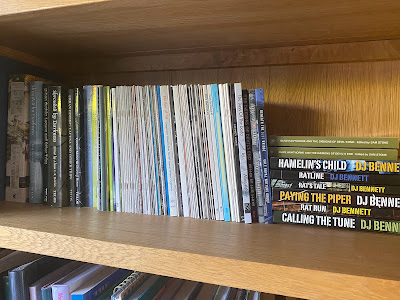I’ve been seeing a lot of stuff online lately about keeping, discarding and re-reading books. In the era of ebooks and online reading, the first two may no longer really be relevant – I have no idea how many books my kindle will hold and even if it did get full, I can store the rest in the cloud on my Amazon account.Not that I entirely trust the cloud (I’m too old. I grew up with the idea that clouds were just weather!). What happens if there’s no internet access, or worse still no computer or no power? What then? It’s a bit like online bank accounts, really; how do you prove that little nest-egg in an online account ever existed if you have nothing to show for it? Which is why I always have a passbook even for mostly-online accounts, so I have something physical with numbers on that proves the existence of my money. I expect that if the internet crashes – if one morning there is no world-wide-web, or maybe the power goes off and doesn’t come back on – that I will have more important things to worry about and currency will no longer be hard cash anyway, but fuel and food and … now we are into apocalyptic territory which given current world events and the past few years no longer seems such a far-away science-fiction concept any more.
I do love apocalyptic fiction (and post-apoc). Post-nuclear (I read Robert Heinlein’s Stranger in a Strange Land when I was 11 and it got me hooked into all his books and sf in general. David R Palmer’s Emergence is another one I loved), post-viral (think Justin Cronin’s The Passage, Stephen King’s The Shining), post-weather event (Stephen Baxter’s Flood and the sequel Ark). Even – and I’m going back a good many years now – Peter Dickinson’s The Changes, which is kind of post-technology.
One of the disadvantages of ebooks is it becomes that much harder to recall and author or title. I’m typing this thinking of examples of other books and having no idea of their names. It’s so easy to scan a physical bookshelf when you might not exactly remember a book, but you know you will know it when you see it! There’s no quick and easy way to see your online library – I can see a list, but there are too many pages and no easy way to quickly find a book/the book when you can’t remember the title.
But ebook or physical? I have a few bookcases (and many, many books less since we downsized and I got rid of hundreds of paperbacks and hardbacks). Some are stacked with paperbacks I know I will never read again and at some point they will go to a charity shop. I have a couple of shelves of all the first 25 of Gollancz’s SF Masterworks series – I will never read some of them but having them all just looks so good … I have a few first-editions and one-off ARC weird copies (Terry Pratchett’s Going Postal in a brown paper wrapper complete with string and label, Stephen Baxter’s Flood again which arrived in a ziplock bag!). But then I have all the shelves of old loved favourites. Fantasy series I got in the 1980s from Forbidden Planet in London as American imprints, odd books that have moved and/or impressed me in some way, books I know I will read again and again, even though I know the plot back-to-front. The brag-shelf which all writers have! Some books you just can’t part with.
So I genuinely have no preference to paper or ebook. Ebooks are easier to read at night – and age means that some paperbacks are just too hard to read unless you are sitting under a strong reading light. But paperbacks have that smell and that association with different times of your life – memories you just can’t get from a sterile ebook. I’ll carry on reading anything and everything and at least I’ll still have my paperbacks when the apocalypse hits – ammunition against the zombies, maybe?



Comments